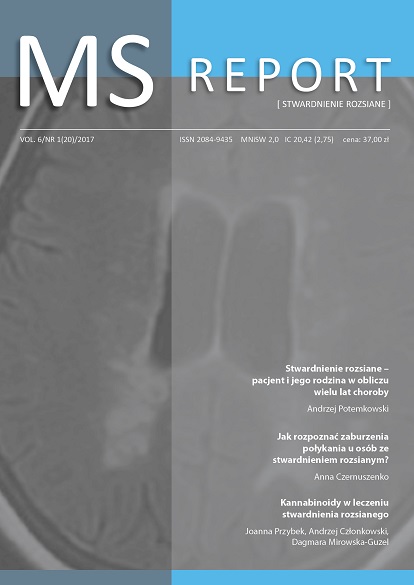Multiple sclerosis – patients and their families facing the challenges of a long-lasting disease Review article
Main Article Content
Abstract
Multiple sclerosis makes it necessary for the whole family to adapt cognitively and emotionally to this chronic disease which means that they have to reformulate and re-evaluate a lot of life goals. Dilemmas of the patient related to the period of early adulthood are gradually losing their significance and maintaining the current family status as well as a job, taking care of children and the possibility to care for them become the most important aims. Essential psychological task is redefining oneself and one’s sense of independence. It becomes important to find the so called free zone.
Article Details
Issue
Section
Articles
Copyright © by Medical Education. All rights reserved.
References
1. Kalb R.: When MS joins the family. W: Kalb R. (red.): Multiple Sclerosis: A Guide for Families. Wyd. 3. Demos Medical Publishing, New York 2006: 1-10.
2. Kalb R.: The emotional and psychological impact of multiple sclerosis relapses. J. Neurol. Sci. 2007; 256: S29-S33.
3. Feinstein A.: The clinical neuropsychiatry of multiple sclerosis. Cambridge University Press Publisher, New York 1999.
4. Gonzalez S., Steinglass P., Reiss D.: Putting the illness in its place: discussion groups for families with chronic medical illnesses. Fam. Process. 1989; 281: 69-87.
5. Korostil M., Feinstein A.: Anxiety disorders and their clinical correlates in multiple sclerosis patients. Mult. Scler. 2007; 13: 5-20.
6. Liu X., Ye H.X., Li W.P. et al.: Relationship between psychosocial factors and onset of multiple sclerosis. Eur. Neurol. 2009; 62: 130-136.
7. Minden S.L., Frankel D., Hadden L. et al.: The Sonya Slifka longitudinal multiple sclerosis study: methods and sample characteristics. Mult. Scler. 2006; 12: 24-38.
8. Koopman W.: Needs assessment of persons with multiple sclerosis and significant others: using the literature review and focus groups for preliminary survey questionnaire development. Axone 2003; 24: 10-15.
9. Koopman W., Benbow C., Vandervoort M.: Top ten needs of people with multiple sclerosis and their significant others. J. Neurosci. Nurs. 2006; 38: 369-373.
10. Wollin J., Reiher C., Spencer N. et al.: Caregiver burden: meeting the needs of people who support the person with multiple sclerosis. Int. J. MS Care1999; 2: 27-34.
11. Kalb R.: Coping and adaptation: making a place for MS in your life. W: Kalb R. (red.): Multiple Sclerosis: The Questions You Have; The Answers You Need. Wyd. 4. Demos Medical Publishing, New York 2008: 255-269.
12. Malcolmson K.S., Dunwoody L., Lowe-Strong A.S.: Psychosocial interventions in people with multiple sclerosis. A review. J. Neurol. 2007; 254: 1-13.
13. José Sá M.: Psychological aspects of multiple sclerosis. Clin. Neurol. Neurosurg. 2008; 110: 868-877.
14. Szepietowska M.: Pomoc psychologiczna dla chorych na stwardnienie rozsiane. W: Potemkowski A. (red.): Psychologiczne aspekty stwardnienia rozsianego. Termedia, Poznań 2010.
15. McKeown L.P., Porter-Armstrong A.P., Baxter G.D.: Caregivers of people with multiple sclerosis: experiences of support. Mult. Scler. 2004; 10: 219-230.
16. Mohr D.C.: Stress and multiple sclerosis. J. Neurol. 2007; 254(supl. 2 ): II65-1168.
17. Feinstein A.: Multiple sclerosis, depression and suicide. BMJ 1997; 315: 691-692.
2. Kalb R.: The emotional and psychological impact of multiple sclerosis relapses. J. Neurol. Sci. 2007; 256: S29-S33.
3. Feinstein A.: The clinical neuropsychiatry of multiple sclerosis. Cambridge University Press Publisher, New York 1999.
4. Gonzalez S., Steinglass P., Reiss D.: Putting the illness in its place: discussion groups for families with chronic medical illnesses. Fam. Process. 1989; 281: 69-87.
5. Korostil M., Feinstein A.: Anxiety disorders and their clinical correlates in multiple sclerosis patients. Mult. Scler. 2007; 13: 5-20.
6. Liu X., Ye H.X., Li W.P. et al.: Relationship between psychosocial factors and onset of multiple sclerosis. Eur. Neurol. 2009; 62: 130-136.
7. Minden S.L., Frankel D., Hadden L. et al.: The Sonya Slifka longitudinal multiple sclerosis study: methods and sample characteristics. Mult. Scler. 2006; 12: 24-38.
8. Koopman W.: Needs assessment of persons with multiple sclerosis and significant others: using the literature review and focus groups for preliminary survey questionnaire development. Axone 2003; 24: 10-15.
9. Koopman W., Benbow C., Vandervoort M.: Top ten needs of people with multiple sclerosis and their significant others. J. Neurosci. Nurs. 2006; 38: 369-373.
10. Wollin J., Reiher C., Spencer N. et al.: Caregiver burden: meeting the needs of people who support the person with multiple sclerosis. Int. J. MS Care1999; 2: 27-34.
11. Kalb R.: Coping and adaptation: making a place for MS in your life. W: Kalb R. (red.): Multiple Sclerosis: The Questions You Have; The Answers You Need. Wyd. 4. Demos Medical Publishing, New York 2008: 255-269.
12. Malcolmson K.S., Dunwoody L., Lowe-Strong A.S.: Psychosocial interventions in people with multiple sclerosis. A review. J. Neurol. 2007; 254: 1-13.
13. José Sá M.: Psychological aspects of multiple sclerosis. Clin. Neurol. Neurosurg. 2008; 110: 868-877.
14. Szepietowska M.: Pomoc psychologiczna dla chorych na stwardnienie rozsiane. W: Potemkowski A. (red.): Psychologiczne aspekty stwardnienia rozsianego. Termedia, Poznań 2010.
15. McKeown L.P., Porter-Armstrong A.P., Baxter G.D.: Caregivers of people with multiple sclerosis: experiences of support. Mult. Scler. 2004; 10: 219-230.
16. Mohr D.C.: Stress and multiple sclerosis. J. Neurol. 2007; 254(supl. 2 ): II65-1168.
17. Feinstein A.: Multiple sclerosis, depression and suicide. BMJ 1997; 315: 691-692.

